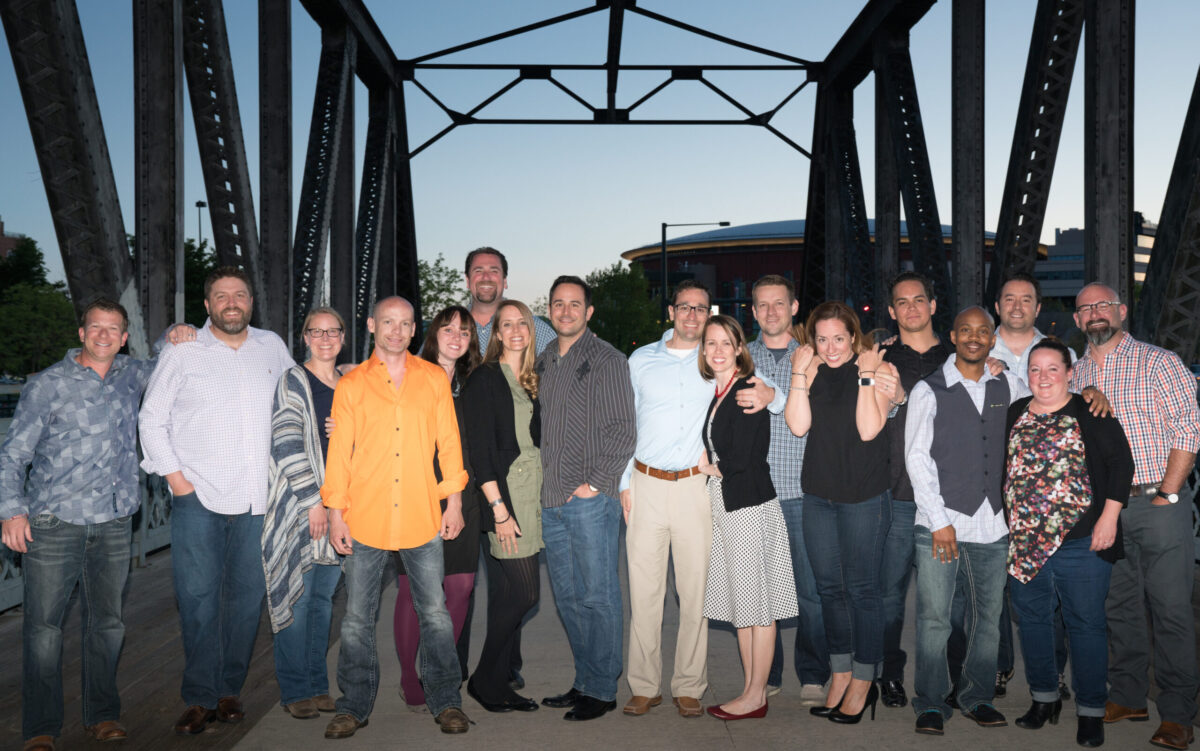I kicked off September on an overnight retreat with over 65 people in the Leadership Denver 2020 program. We are a class with varying backgrounds in business, non-profit, and civic roles across Denver. It’s sponsored by The Denver Metro Chamber Leadership Foundation, with the mission to educate and inspire people who want to make a difference as leaders in their community.
We are just starting to get to know each other and the retreat had it all. A long car ride with a carpool (or in our case, the ‘dad pool’), professional facilitators, small team breakouts, skits, a late night, and a legit ropes course.
I was super excited and those that know me well, know that I absolutely love these type of things. (Maybe I should have gone the camp counselor career path route).
These retreats are designed to push comfort zones.
- Meeting new people
- Speaking in front of a lot of people
- Doing physical challenges
- Dancing in front of others
- Connecting with strangers
- Sharing self-assessment results
- Small talk
- Not-so-small talk
So in sitting down to post this reflection, I learned that there is a Wikipedia page dedicated to defining the comfort zone, and it is simplified to 3 phycological states.

- Comfort Zone
- Optimal Performance Zone
- Danger Zone
Note: Some of my classmates were talking a lot about the ‘freak out zone’, so I think there may be a fourth ring beyond the danger zone.
Insights and Takeaways
I was in my element, definitely hanging out in the comfort zone and optimal performance zone. However, I learned that not everyone shares my affection for these type of situations (at least at first… or maybe never for others). The first insight for me was that we don’t all have the same comfort zones. It wasn’t about me feeling comfortable, but how do I support others and meet them where they are.
Comfort zones have invisible boundaries. So when we are challenged to get out of our comfort zones, it’s difficult to know where our lines are drawn. We might not even know where our comfort zones begin and end until we are in the middle of an experience. (Although I think it is unanimous that 99% of people are uncomfortable with the ‘close talker’, and need at least an arms-length distance from someone when having a conversation). Anyway, the takeaway for me is to remember that others don’t know your comfort zone boundaries either. So let them know where you are, where you want to be, and then they can help you get there.
This is not on the test (in fact, there is no test). Seth Godin talks a lot about this. We have trained ourselves to want to know the right answers, many times before we even begin. We want to ensure we know the rules of engagement and how we will be measured for success before taking the leap. However, there is no right or wrong way to go through experiential learning. It’s just like life. You have to just be you, evaluate the results, and make adjustments.
Feeling pushed, but not shoved. I use this phrase a lot to describe how I like to be lead in my work life. It was also something that came to mind during the retreat. How do you push someone from their comfort zone into the optimal performance zone, without going to the danger zone (or “getting on the express lane to the freak out zone?”) At work, we talk a lot about how we stretch our employees to help them grow in their careers. We want to push people beyond their comfort zones, but ensure they are ready. Ensure we don’t promote someone too quickly and send them from a comfort zone right into the danger zone. If the person isn’t ready to jump, don’t be the one to shove them off the obstacle. Figure out where they are at and then go from there. When they are ready, they’ll jump.

Comfort zones change but never go away. I’ve mentioned to my friends that in my early 20’s, I honestly thought that life got easier the older that you got. That you figure life out and roll with it. (I know right… I am much wiser now!) Shifting in and out of comfort zones is part of life as we get exposed to new challenges and opportunities. In my career, I struggle with transitioning in and out of individual contributor and leadership positions. At home, as soon as I get comfortable, our daughters are moving into another growth stage and I’m working with Katie to stay mindful and not get overwhelmed. You never grow out of having comfort zones and you face them in all phases of life from childhood into the golden years.
So why do comfort zones matter?
- Learning is uncomfortable
- Leadership is uncomfortable
- Facing challenges is uncomfortable
- Letting others help you is uncomfortable
- Not having answers is uncomfortable
- The unknown is uncomfortable
I’m also learning that even though I may not have trouble speaking in front of a group, not exactly knowing what words I am going to say. Putting these blogs out there on the internet is definitely uncomfortable and stretching my comfort zone. So thanks for reading and I appreciate all of the support.
